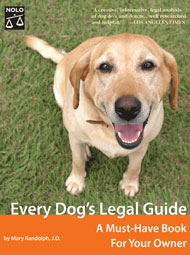Elderly or Disabled Tenants
The special place pets occupy in the lives of older people or people living with disabilities is well recognized. Finally, at least in some places, the law is taking that special bond into account.
Subsidized Housing
Older or disabled people, living in government-subsidized housing, being forced to give up pets that are their cherished companions - it doesn't make for good press for the bureaucrats responsible. Pressure on those government officials has yielded results.
Tenants in "federally assisted" housing for the elderly or handicapped are allowed by law to own pets.4 This rule applies even if the federal government does not own the rental housing - it's enough that a federal agency (the U.S. Department of Housing and Urban Development, for example) subsidizes it. Owners and managers may place reasonable regulations on pets, after consulting with tenants.5 Contact a local HUD office or your county Housing Authority to find out if a particular rental is covered.
Several states have also taken action. In California, residents of public housing developments (those owned and operated by a state, county, city or district agency) who are over the age of 60 or disabled may keep up to two small pets per apartment.6 Arizona, Connecticut, the District of Columbia, Massachusetts, Minnesota, and New Hampshire have similar rules, allowing tenants in state-owned housing developments for the elderly or disabled to have pets.7 (In Connecticut, a tenant may have a pet if the housing project allowed pets when the person applied for admission.)
The laws allow the public agencies to make reasonable regulations about pets. In Massachusetts, for example, policy guidelines issued by the state limit tenants to one pet; a dog must not weigh more than 40 pounds,and it must be spayed or neutered. The Arizona statute forbids requiring a tenant to pay a deposit of more than one month's rent.
But regardless of standard lease terms, landlords who receive federal money must also make "reasonable accommodations" for disabled tenants, as long as the accommodations don't impose undue hardship on the operation of the property.8 For example, a New Jersey court ruled that a man with paraplegia might be allowed to have a dog that was bigger than the 20-pound limit imposed by the standard lease. The man had trained the dog to retrieve objects for him, and two doctors stated that keeping the dog was important to his emotional well-being. The landlord could not automatically exclude the dog, the court said, without an inquiry into whether allowing the dog to stay was a reasonable accommodation for the disabled tenant.9
Similarly, a Massachusetts woman with a psychiatric disability was allowed to keep her cat, despite a no pets rule in her subsidized apartment complex. At her eviction trial, experts testified that she was emotionally attached to her pet and had "perhaps even psychological dependence" on it. A state appeals court ruled that accommodating the tenant was required under the law; the animal had caused no problems or complaints, and allowing her to keep it would not pose a hardship for the management of the apartments.10
If the management makes reasonable accommodations and the pet still creates problems, the tenant may be evicted. For example, a Connecticut housing complex for the elderly and disabled had trouble with a tenant whose dog frightened and bothered other residents. The dog's owner, a chronic schizophrenic, did not walk his dog in the designated areas or clean up after it, and left it in his apartment for long periods of time. Despite the efforts of a social worker and the dog trainer whom she enlisted to help, problems persisted. A court reluctantly concluded that the management had made the reasonable accommodations required by law, and could proceed with an eviction.11
Private Housing
In most states, only government-subsidized housing is subject to special rules allowing pets. But in Arizona, the District of Columbia, Minnesota, and New Jersey, elderly or disabled tenants have rights to keep pets in either public or private housing. New Jersey, for example, guarantees the right of senior citizens in any "senior citizen housing project" to have pets. Any building with three or more units, intended for and solely occupied by persons 62 or older, is covered by the law. (Owner-occupied buildings with less than three units are exempted.)
Residents can have a dog, cat or any other animal that doesn't constitute a health or safety hazard. A landlord who unreasonably refuses to renew a tenant's lease because of a pet that is properly cared for and not a nuisance can be fined up to $500.12
WHY IT MATTERS
Many elderly people wouldn't move to better housing if it meant giving up their pets, according to a new study. Researchers talked to 2,300 older people in Evanston, Illinois, nearly one-third of whom owned pets. Of the pet owners, 86% said pet ownership dictated where they lived.13
